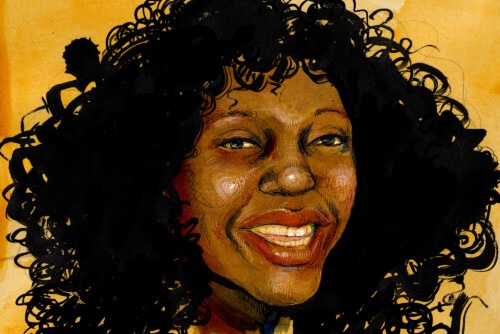A response to the panel “Using Knowledge, Advancing Activism” at the conference Activism and the Academy: Celebrating 40 Years of Feminist Scholarship and Action. Watch the video here:
The Activism and the Academy Conference, celebrating the 40th anniversary of the Barnard Center for Research on Women (BCRW), could not have been more timely. The BCRW came to life in a period of massive social upheaval and large social movements around the world, with millions of people fighting for
women’s rights, civil rights, national independence, economic justice, and for another world. The movements gained a lot, but they were followed by a long, dark period of right-wing backlash and capitalist expansion.
Forty years later, social movements for justice are gaining momentum again. From the Arab Spring to the Wisconsin labor struggles, people are fighting against the right and for democracy. On the day that the BCRW conference took place, Occupy Wall Street was celebrating one week of their encampment in lower Manhattan. The activists joined with other protestors who were marching in “A Day of Outrage” in response to the execution of Troy Davis in Georgia. The New York Police Department cracked down with full force, arresting, beating, and pepper-spraying dozens. Some of this was photographed and videotaped, and soon the world was watching, as support for Occupy grew around the country and the world.
At the conference, Laura Flanders mentioned Occupy and urged attendees to go to Zuccotti to experience it and to support the occupiers. The issues raised at the BCRW conference struck at the heart of some of the Occupy issues. I will highlight three in particular.
First, while Occupy activists ranged from young to old and highlighted a wide range of issues, student debt was a key focus. The BCRW panels challenged the direction of higher education, particularly the expansion of neoliberal ideology both in the way universities are run and in the way knowledge and course content is produced and taught. In the United States, public universities have experienced massive defunding. States have continued to cut funding for public universities, making them more and more reliant on private funding from individual donors or corporate grants. In a number of states, public funding now accounts for less than half of the university budget, making the concept of “public education” questionable. Professors are pushed to conduct research that can earn a profit and draw wealthy donors. Departments are urged to become “profit centers.” Meanwhile, as tuition rises and loans and grants shrink, students are forced to rely on loans to make it through college. As other avenues of the economy have faltered, investors are looking at higher education as a cash cow. Recently, student debt topped one trillion dollars, making it the largest source of debt in the United States, trumping even credit card debt.
Students face not only high debt, but a bleak labor market, calling into question the viability of the entire model. How will students pay off such large debts if they cannot find work, or cannot find jobs that pay a living wage? Yet, it seems that not going to college is not an option either, as unemployment and wages for those without a college degree is even worse than for college grads.
Students at some schools were once able to pay their own way. For example, I attended the University of California, where it was possible at the time to cover tuition and fees by working a minimum-wage job during the summer and other school breaks; today that is not possible.
These issues have, on the one hand, made it more difficult for working students to engage in campus activism; but on the other hand, have created a mass of outraged and militant students ready to fight back and form the core of Occupy activists. Students in other countries are seeing similar trends and are also fighting back; some of the largest protests in the last year have been organized by students in Montreal and students in Chile.
The second issue that connects the BCRW mission and conference with recent uprisings is intersectionality. The term, first used by Kimberlé Crenshaw in 1989, highlights how we must understand the world as intersecting axes of identity and oppression. Feminists of color in the 1970s felt pressed to choose at times between a “women’s movement” or a “civil rights movement,” while other activists felt pulled to choose between highlighting gender or class. An intersectional approach allows us to see how we cannot separate class, gender, race, sexuality, nationality, or other aspects of our lives. It is not a matter of “add and stir” but a truly integrated perspective. Feminist theory has contributed much to our understanding of intersectionality.
Today’s movements are more reflective of an intersectional approach. While many movements suffer internal weaknesses based on demographic disparities and inequality between participants, the issues raised are more likely to to reveal an understanding of the ways in which axes of oppression intersect. Occupy Wall Street, in refusing to put forth a set of demands, created a space where it was less likely that one site of oppression would be privileged over others. Even struggles like the one that took place in Wisconsin, where union members came out to defend the right to collective bargaining, were quickly merged with broader demands, in part because the attack on unions was combined with an attack on the state budget and public programs. Activists connected labor rights to the struggles for health care, education, family farms, LGBT rights, and a democratic voice. As family farmer Tony Shultz said at a large rally in Madison, “Either we go up together, or we go down together.” With Eygyptians sending support to Wisconsin; Occupy Wall Street protesters marching in solidarity with Quebec students; and Nigerian oil workers and doctors calling for a general strike, connecting domestic issues with others under the banner of Occupy; these movements have been bringing to life the intersectional claim that “an injury to one is an injury to all.”
Third, the BCRW conference raised questions of knowledge and expertise, in the academy and in movements. This has long been a feminist issue, as patriarchy has usually gone hand-in-hand with the idea that knowledge belongs to “experts,” and is to be guarded. Neoliberal policies have pressed for the privatization of more and more knowledge, attempting to convert public and community information to “intellectual property.”
While these uprisings around the globe differ in many respects, they share a common thread in their call for greater democracy and a more inclusive society. This includes rejecting the expert-driven economy and political arena, and expanding our access to information and leadership. Neoliberalism has been presented as the only path to economic growth, and banks, policymakers, and international institutions have pushed countries to adopt what Thomas Friedman calls the “golden straightjacket”—a one-size-fits-all program of neoliberal reform. Movements have been fighting back, asserting that this program works to benefit the 1 percent at the expense of the 99 percent. We have been fighting to build our own worlds, based on local needs and knowledge. We reject the model that says we must privilege exports over imports, union busting over workers’ rights, or tax cuts over government investment. We reject the claim that economic experts know what is best for our communities, and that “profit maximization” is in the best interest of everyone. We know that societies cannot be healthy as long as any one member is sick, and that people are not free while some of us are in prison. But as Rinku Sen explained at the BCRW conference, information alone is not power: “power is power.”
As social justice activists, we have fought to gain power, and in the process we have won a lot—but we have also been let down by some of our own organizations and political parties, and by some of the left’s own experiments in alternative communities or socialist societies. But we know that we can still do better than the world we live in today. We have a lot of great ideas about what that alternative world might look like, but we will have to fight for the right to speak and make our knowledge into public knowledge. As Dean Spade noted, having the information and knowledge does not always result in victory. We will have to continue our struggle to expand democracy and build inclusive societies and organizations. We must continue to share our stories and link our struggles. Another world is possible. The scholars and activists of the BCRW will help us.



